| Date | Event |
| 10/8/2024 -10/8/2024 | 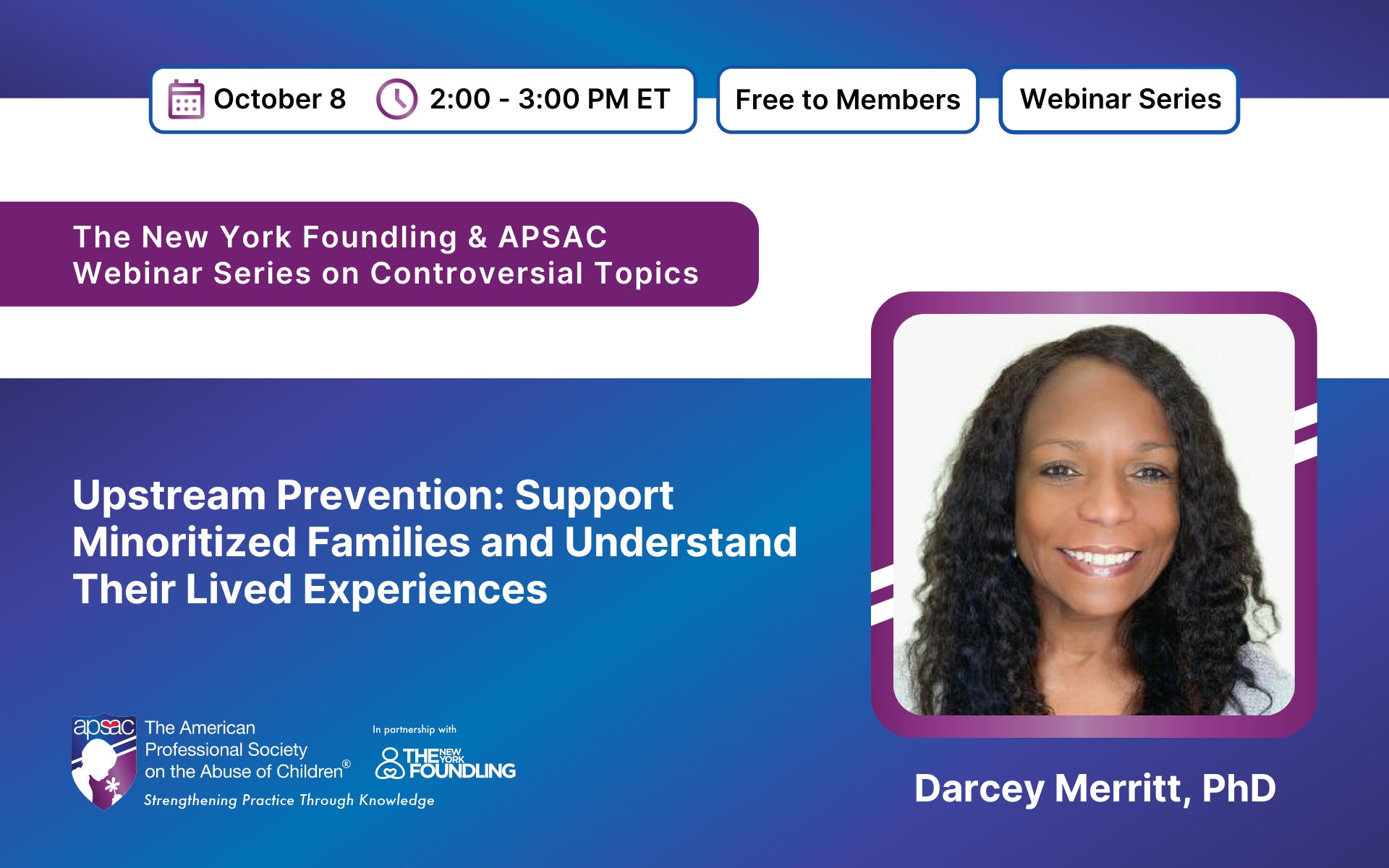 General Admission (individual session): $30.00 APSAC Members and The New York Foundling Staff Admission: Free 1 CE Credit (Social Work & Psychology) Non-Members: $30.00 1 CE Credit (Social Work & Psychology) APSAC Members and NY Foundling: $20.00 APSAC Members: You will receive your discount automatically when registering. The New York Foundling Staff: Please email FontanaCenter@nyfoundling.org to request your entry code. Title: Upstream Prevention: Support Minoritized Families and Understand Their Lived Experiences presented by Darcey H. Merritt, MSW, PhD Description: Child welfare system exposure to parents and children is traumatic on multiple levels. Trauma is inflicted by punitive systems oversight and sadly manifests across generations. Themes identified as trauma are living in poverty, persistent fear of family disruption, and ongoing anxiety during interactions with authorities. Many of our established social and human services have been structured based on the insidious nature of racism and oppression. The lived experiences of child welfare system-impacted parents are rarely considered from a social justice perspective. Parents and children endure the oversight of the child welfare system in myriad ways, and these experiences usually vary based on race, ethnicity, and socioeconomic status. The presence of authorities with the power to disrupt one’s family is a pervasive and enduring trauma. Whilst acknowledging racism is embedded in many human service systems, it follows that child welfare system policies and practices are by design intended to admonish parents for improper care of their children. Child, parent, and family assessments are made without any consideration of family strengths, resilience, or the indisputable fact that systemic racism is the culprit of sub-optimal parenting. It is critical to understand that lower socioeconomic status cannot be disentangled from lived experiences of racism and oppression which results in pervasive systems oversight. Racialized poverty-related family surveillance is harmful to minoritized families in that they are traumatized whilst they navigate oppressive oversight and pervasive codified racism. This presentation will encourage reflection on the notions that racism is the mechanism by which child welfare system racial disproportionality is evidenced through policies underpinned by design flaws, policy-mandated reporting, and placement options. Consequently, racial disparities are grounded and proliferate in systemically oppressive organizations and ultimately pose a threat to the public health of society. Qualitative data will be presented in the historical context of systemic racism that underpins the treatment of Black families in the U.S. Cancellations: No cancellations. No refunds. Registration is transferable. Requests for transfer to a future event will also be considered on a case-by-case basis. If you have any questions please email us at onlinetraining@apsac.org. more info... |
| 10/16/2024 -10/16/2024 | 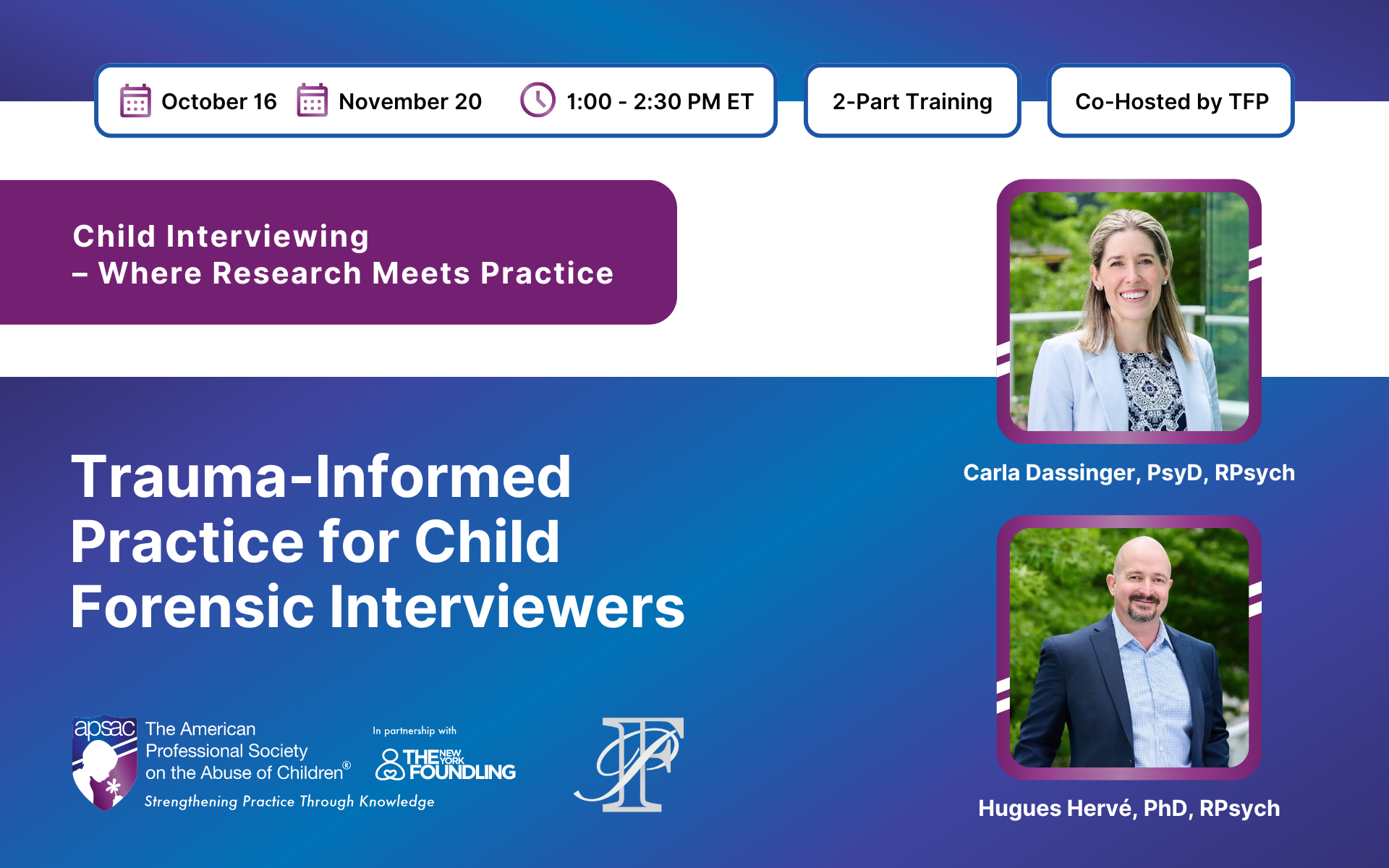 Please use the registration button to the left to register for Part 1 & 2 Member Registration: $100 Non-member Registration: $120 Event dates: October 16 & November 20 Trauma-Informed Practice for Child Forensic Interviewers Trauma-informed practice (TIP) is a critical component of child forensic interviewing. TIPs can reduce the negative impact that forensic interviews could have on survivors. They can also help interviewers adapt their memory-based interviews to meet the needs of traumatized individuals. This two-part webinar series will examine the impact of trauma on the brain and help interviewers translate the research on trauma into actionable, client-centered, trauma-informed practices. PART 1 (October 16) Click here to register for part 1 only Title: Trauma, the Brain, and the Investigation Description: Part one will focus on the impact of trauma on the brain, with special attention given to how trauma affects survivors during investigations and forensic interviews. This knowledge is key to minimizing interviewer biases and errors. Presented by: Carla Dassinger, PsyD, RPsych PART 2 (November 20) Click here to register for part 2 only Title: Trauma-Informed Practice Description: Part two will focus on the four pillars of a trauma-informed approach to forensic interviewing: Safety, Predictability, Empowerment, and Compassion (SPEC). By learning TIPs for child forensic interviews, participants will be empowered to conduct more effective client-centered interviews. Presented by: Hugues Hervé, PhD, RPsych more info... |
| 10/17/2024 -10/17/2024 | 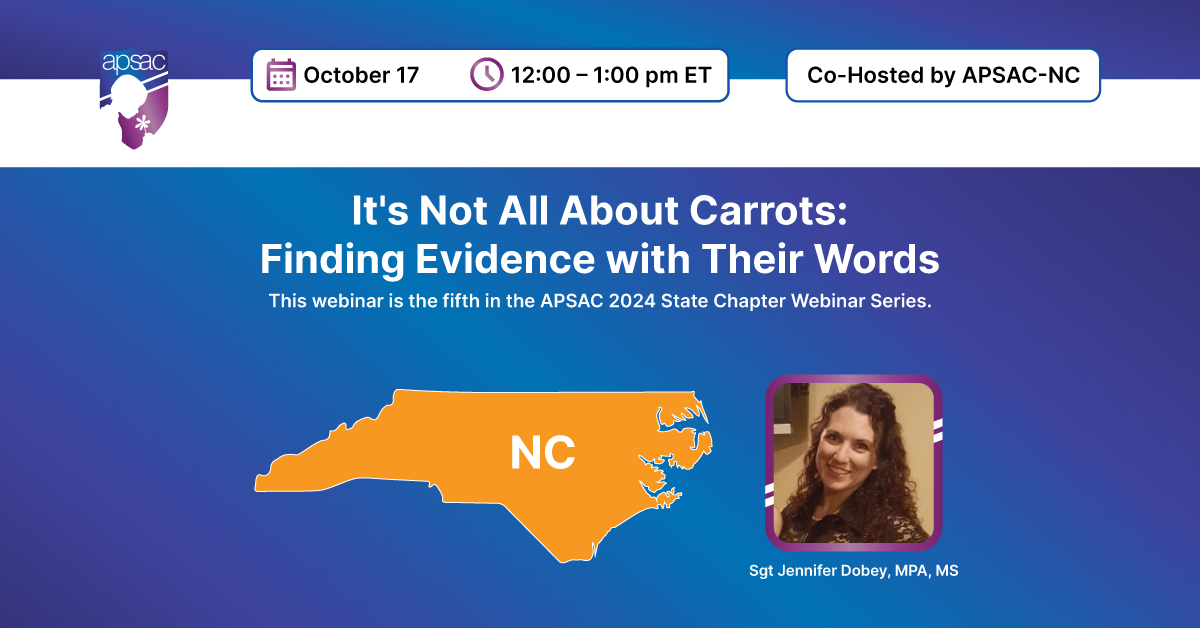 This webinar is the fifth in the APSAC 2024 State Chapter Webinar Series APSAC Members: Free Non-Member Registration: $30 Webinar Description: Educator sexual misconduct is a serious problem; however, there have been few large-scale studies from which to gather its true extent. Over a period of five months, a middle school teacher was able to groom and sexually assault two of his students who were just 12 and 13 years old ? typical predator behavior. When a search warrant was executed at the suspect's house, detectives found much of the evidence had already been removed ? except for one piece. Thanks to the detailed disclosure of both victims, this case was able to be brought to a successful resolution with the defendant being indicted on 29 felonies followed by plea of guilt. Given the frequency of delayed disclosures in child sexual assault cases, this case is a perfect example of why the skill of interviewing is crucial in being able to obtain a very detailed disclosure to reach successful prosecution. This case study will take participants through the initial report of incident, the disclosures of the victims, challenges with mandatory reporters and how during the execution of the search warrant, the presence of a stuffed toy bunny would seal the fate of the predator. Presenter: Jennifer Dobey, MPA, MSCancellations: No cancellations. No refunds. Registration is transferable. Requests for transfer to a future event will also be considered on a case-by-case basis. If you have any questions please email us at onlinetraining@apsac.org. more info... |
| 10/18/2024 -10/18/2024 | 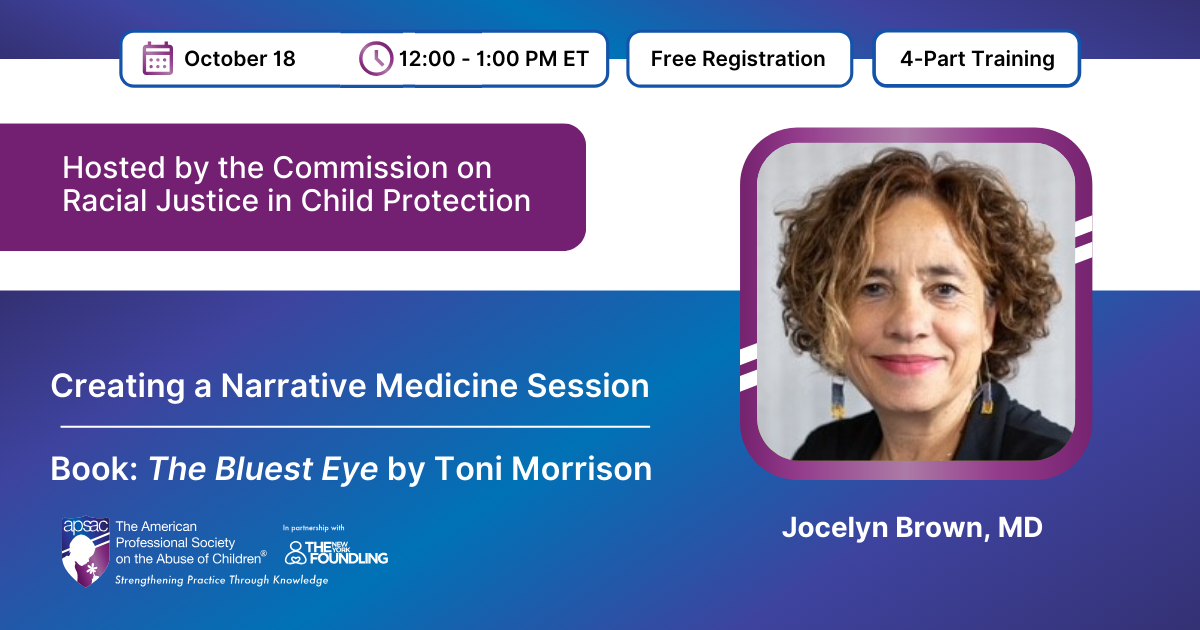 Title: Creating a Narrative Medicine session with “The Bluest Eye” by Toni Morrison Description: This session will use the format of a narrative medicine workshop by closely reading an excerpt of the novel “ the bluest eye” , write to a prompt and share the experience. “The Bluest Eye” by Toni Morrison can be purchased here. Presenter: Jocelyn Brown, MD, MPH, MS |
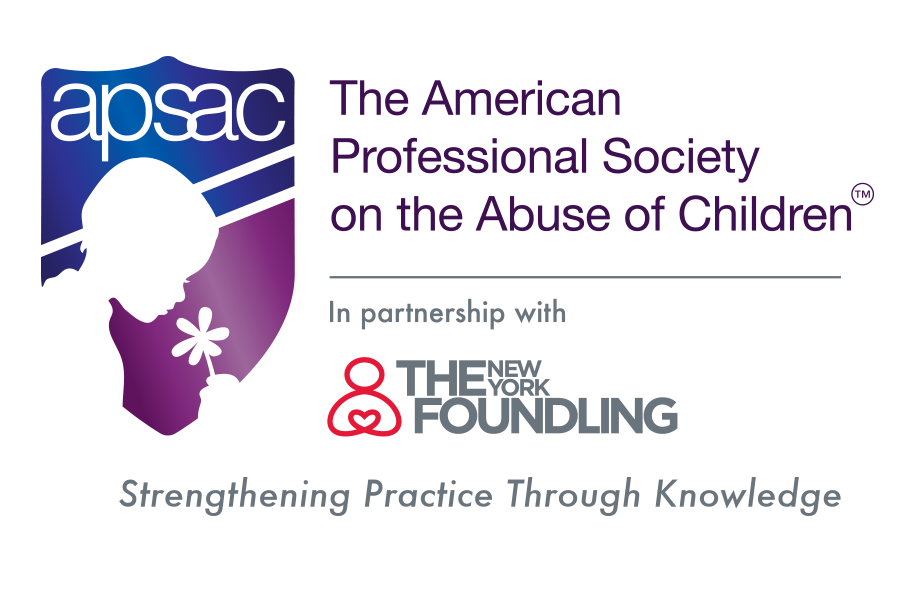
Calendar of Events - The American Professional Society on the Abuse of Children
Events available for Registration... The New York Foundling & APSAC Webinar Series on Controversial Topics 2/14/2024 - 12/17/2024 register for this event... The New York Foundling & APSAC Webinar Series on Controversial Topics 11/14/2024 - 11/14/2024 register for this event... November 2024 Reading Club - Transforming the Child Welfare System: Helping Youth Find their Voice 11/15/2024 - 11/15/2024 register for this event... Healthcare Section 11/19/2024 - 11/19/2024 register for this event... Child Interviewing - Where Research Meets Practice (Part 1 & 2 Registration) 11/20/2024 - 11/20/2024 register for this event... Atención Informada en Trauma (Trauma Informed Care) 12/5/2024 - 12/5/2024 register for this event... Domestic Violence Section 12/10/2024 - 12/10/2024 register for this event... December 2024 Reading Club 12/13/2024 - 12/13/2024 register for this event... Healthcare Section 12/17/2024 - 12/17/2024 register for this event... The New York Foundling & APSAC Webinar Series on Controversial Topics 12/17/2024 - 12/17/2024 register for this event... APSAC Pre-Conference 2025 Registration- Renewing Hope: Innovative Strategies for Engaging Families in Child Physical and Sexual Abuse Interventions 1/26/2025 - 1/26/2025 register for this event... |
Events in the month of October 2024 | |||||||||||||||||||||||||||||||||||||||||||||||



